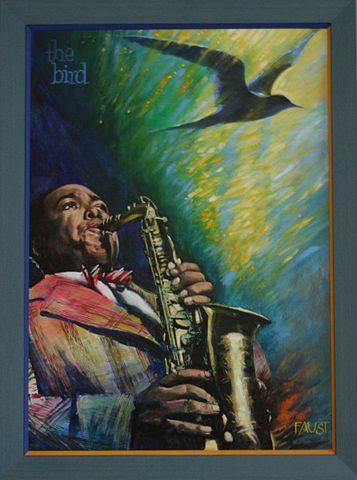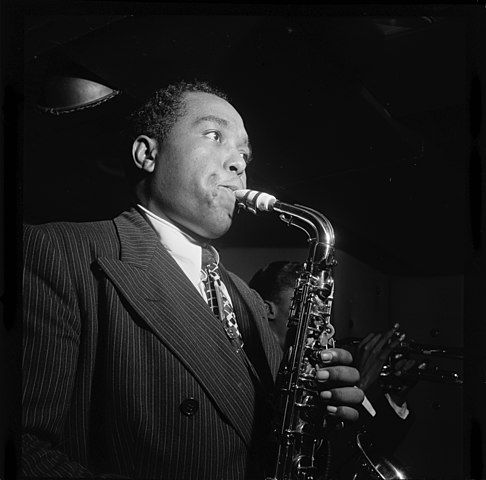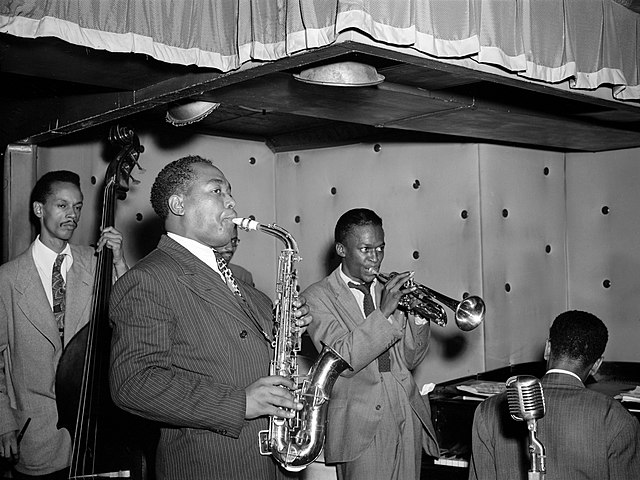One of the most important musicians in modern jazz is honored in two books newly acquired by the Thammasat University Libraries.

Celebrating Bird: the triumph of Charlie Parker by Gary Giddins and Bird: the life and music of Charlie Parker by Chuck Haddix examine the life of this musical legend. As anyone knows who has seen Bird, the 1988 movie directed by Clint Eastwood, the saxophone player Charlie Parker was born in Kansas City, Kansas, USA and only lived to be 34 years old, dying in 1955. His serious and thoughtful way of playing made a deep and lasting impression. Many previous jazz saxophonists, especially Lester Young, had used the instrument to express emotions and personality, but Parker seemed to bring something new. By his sober approach, he could make jazz sound more like a self-conscious high art form than it was before. Of course previous jazz players were also great artists. Just because they placed joyful dance-like expressions did not mean they lacked seriousness. Parker and some colleagues such as the trumpeter Miles Davis made jazz something to sit down and listen to closely, instead of dancing to at a nightclub. Sometimes Parker’s music sounds agitated and upset and he frequently played music too quick for anyone to dance to. The TU libraries own a couple of brief excerpts of his music-making that you can listen to, and much is also available on YouTube. People who wanted to hear Parker play in concert during his lifetime were sometimes disappointed because he would arrive late for performances and was a longtime drug abuser. His use of heroin eventually ruined his life and his health. This unfortunate fate, described in the movie Bird, should not distract from the fine recordings which he left behind. The best of these performances required much concentration and technical ability.
Jazz in Thailand
As all Thai people know, jazz has also played an important role in the musical history of Thailand. His Majesty King Bhumibol Adulyadej is a skilled saxophone player and jazz composer of gracefully swinging, blithe, and tender melodies. As many biographies note, His Majesty first started to study the saxophone in Lausanne when he was 15 years old, under the guidance of an Alsatian teacher. At first he had tried to play the accordion, since his brother and sister were playing the piano. He found that the accordion’s sound did not go well with the piano. Instead, after attending a concert at a hotel in Arosa, Switzerland, King Rama IX was intrigued by the trumpet. His mother convinced him that playing the trumpet might be too strenuous, so the saxophone was agreed upon as a compromise. King Rama VIII and King Rama IX both decided they wanted to play the saxophone.

They soon bought a second-hand saxophone, with the Princess Mother paying for half and the rest of the cost covered by the Club Patapoum, a two-member private club formed by the two brothers. When the first day of lessons arrived, King Rama VIII pushed his brother into the room to take his place and took up the clarinet instead. At first King Rama IX studied classical music, gradually advancing to jazz which he relished for its lively rhythms and improvisatory freedom. He played the saxophone along with recordings of noted jazz bands, as most young aspiring musicians have done. Among his favorite saxophonists were Sidney Bechet, Johnny Hodges, and Benny Carter, all African-Americans of an earlier generation than Charlie Parker. Although Benny Carter was born long before Charlie Parker, he had a healthier lifestyle and lived until the age of 95.
King Rama IX as Jazz Composer
The King would eventually learn to play the soprano, tenor, and baritone saxophones, the clarinet, and the trumpet. With such wide instrumental interests, it was natural that he also began to compose jazz music. Starting in his teens, and while obviously attending to many other heavy responsibilities, the King managed to find time to compose around two melodies per year for more than twenty years, creating a delightful catalogue of songs of many different moods and purposes. Although done in the true amateur sense – for the love of music – the King’s jazz musicianship was of a high level that impressed professionals. During a 1960 state visit to the United States, he was urged to play clarinet for two numbers with a band, Ken Alford’s Dixie Cats, in Honolulu, Hawaii. This band was more than just of local interest. The internationally celebrated jazz superstars Louis Armstrong and Benny Goodman had also performed as guests of the Dixie Cats. On the same trip, in New York His Majesty played the saxophone with Benny Goodman, Jack Teagarden, Lionel Hampton, and Stan Getz, some of the finest jazz musicians who ever lived. Another distinguished ensemble, Les Brown and His Band of Renown, recorded some of the King’s compositions in 1996.

Playing in company.
Doubtless inspired by his experiences listening to and playing with jazz ensembles, the King formed his own Dixieland/New Orleans-style group, Wong Lay Kram (The Vintage Band), which performed once a week on Fridays. These performances were eventually broadcast. By this time the singer, composer and bandleader Eua Sunthornsanan (1910-1981) had already founded Thailand’s first Western-style jazz orchestra, the Suntharaporn band. Khun Eua helped to popularize the Luk krung (child of the city) style, also called phleng luk krung, so named to indicate its difference from less polished rural folk music. Alertly snappy, this music raised spirits and was easy to hum along with or dance to. Jazz had already been heard in Thailand since the 1930s, and its popularity slowly grew. Not all Thai listeners were ready to accept Western-influenced sounds, preferring more traditional tunes, but eventually jazz was more widely enjoyed in the Kingdom.
Jazz in Thailand’s future.
As a sign of future musical developments, in 2012 the Thailand International Jazz Conference was held in Bangkok, inviting many international performers. Based at the Mahidol University College of Music, the conference aimed at using jazz as a way to achieve “the Society of Knowledge—the Society of Happiness.” Bangkok dwellers who are seeking knowledge and happiness through jazz may find it in live performances at such well-known venues as the Bamboo Bar of the Oriental Hotel; Brown Sugar on Phra Sumen Road in Phranakorn; the Cotton Jazz Bar at the Shanghai Mansion Bangkok Hotel on Yaowaraj Road in Samphantawong; the Jazz Happens Bar on Phra Athit Road; The Living Room at the Sheraton Grande Sukhumvit on Sukhumvit Road, Klong Toey; Niu’s on Silom Jazz Blues Bar and Restaurant; and Saxophone on Phayathai Road, Victory Monument. Clearly with so many choices available for jazz lovers in the Kingdom, there is lasting demand for this kind of music. Charlie Parker would have been pleased.

(all images courtesy of Wikimedia Commons).
